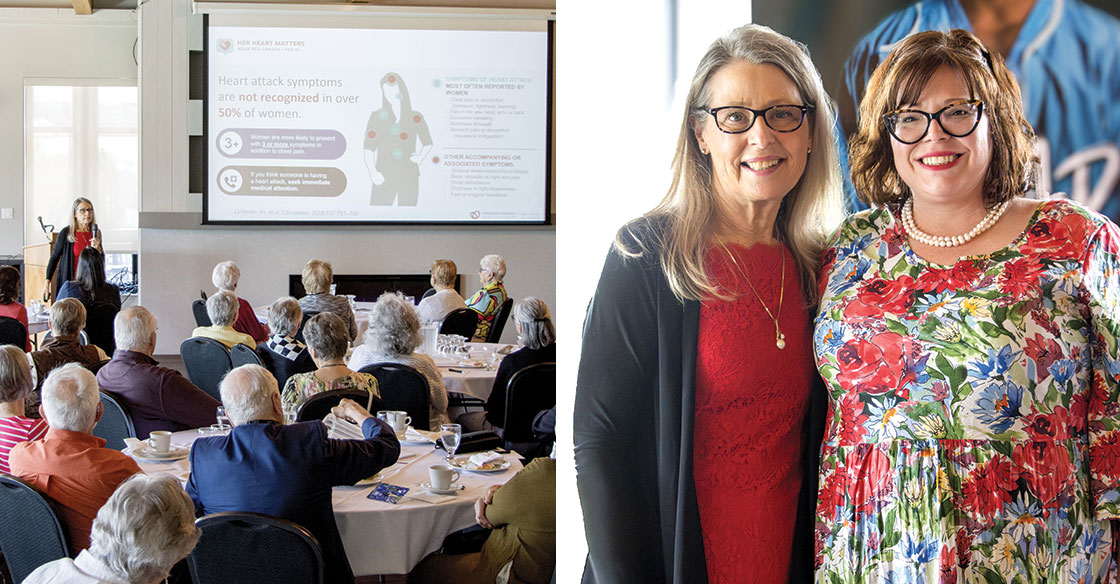
Pictured: Dr. Sharon Mulvagh
Heart disease remains the leading cause of premature death among women globally, yet awareness and understanding of its risks and symptoms often lag behind. Traditionally, women’s heart health is an area that’s overlooked, under-researched and underfunded. National leaders like Dr. Sharon Mulvagh are on a mission to change this by raising critical awareness and offering hope, treatment and empowerment to patients and families.
Dr. Mulvagh recently spoke at our Friends of the QEII Foundation Spring Tea, shedding light on these critical issues and offering insights into how women can take charge of their heart health.
Q: Why is heart disease such a significant concern for women?
A: Heart disease doesn't discriminate based on gender. It's the top killer of women worldwide, claiming the lives of one in three women in Canada alone. Contrary to popular belief, it's not just a 'man's disease.' Women often don't recognize their symptoms as being related to heart issues, which often delays their diagnosis and treatment.
Q: What are some of the common symptoms of heart attacks in women that they should be aware of?
A: Women often experience symptoms beyond the classic chest pain. They may have discomfort or pressure in the chest, but they can also feel pain in the jaw, neck, arm, or back. Sweating excessively, shortness of breath, nausea, indigestion, and unusual fatigue are also common. This diversity in symptoms complicates recognition, as women are more likely to present with three or more symptoms during a heart event.
Q: Why do you think heart attack symptoms are often missed in women, and what can be done to improve recognition?
A: Unfortunately, over 50 per cent of women don’t recognize the early signs of a heart attack. There are many reasons for this, including fear, embarrassment, or misinterpretation of symptoms as something less serious. Many of the symptoms women experience during a heart event can be vague and easily dismissed, both by women themselves and their care providers. This is why it's crucial for women to listen to their bodies and seek and advocate for medical attention if something feels off.
In many cases, women delay seeking the help they need, which is why education and awareness are paramount. Every minute counts during a heart attack, and seeking prompt medical attention can save lives and prevent further damage.
Q: How can healthcare providers and society at large better support women in managing their heart health?
A: There’s a significant gap in both women’s knowledge of heart disease and healthcare providers’ preparedness to address it. We need better education, more research focusing on women’s cardiovascular health, and increased representation of women in clinical trials. Healthcare professionals should routinely discuss heart health with their female patients.
Q: How can women advocate for their heart health and ensure they receive appropriate care?
A: Education and awareness are key. Women should be proactive about understanding their risk factors, which include lifestyle habits, family history, and specific conditions like polycystic ovary syndrome (PCOS), diabetes, inflammatory and autoimmune disorders, early menopause and pregnancy complications. Regular check-ups that include discussions about heart health with your family doctor or healthcare providers are essential.
Q: How can pregnancy and menopause affect women's heart health?
A: Pregnancy acts as a 'stress test' for the heart, revealing potential risks like gestational diabetes or hypertensive disorders. Menopause, with its hormonal changes, also increases the risk of heart disease. Estrogen plays a protective role in cardiovascular health by helping to maintain healthy blood vessels and cholesterol levels. When a woman’s estrogen levels drop during menopause, it can lead to higher levels of bad cholesterol (LDL) and lower levels of good cholesterol (HDL). Awareness of these phases and their impacts is crucial for managing long-term heart health.
Q: What steps can women take to prioritize their heart health?
A: First and foremost, women should be self-aware about their health. Even if they perceive themselves to be at lower risk, it’s never too early or too late to start prevention strategies. Knowing your family history is crucial as it provides insights into potential risks. Additionally, maintaining a healthy lifestyle — being physically active, eating a balanced diet, avoiding tobacco and excessive alcohol, managing stress, and getting regular check-ups to monitor blood pressure, cholesterol, and blood sugar — are all vital steps in reducing your cardiovascular risk.
Q: Any final thoughts or advice for women regarding heart health?
A: Take ownership of your heart health journey. I want every woman to understand that she has the power to take control of her heart health. Heart disease is largely preventable—about 80% of cases can be avoided through lifestyle changes.
Educate and advocate for yourself, stay informed, listen to your body and prioritize regular health check-ups. Remember, your heart deserves the same attention and care as the rest of your body.

Left to right: Dr. Sharon Mulvagh speaks to an engaged crowd at our largest-ever Friends of the QEII Foundation Spring Tea event; and Dr. Mulvagh pictured with Nicole Nickerson, our guest speaker, QEII patient and a national advocate for women’s heart health.
About Dr. Sharon Mulvagh
Dr. Mulvagh graduated with her MD from the University of Ottawa, then completed internship at Dalhousie University, residency at Boston University, and fellowship at Baylor College of Medicine (Texas), where she also worked as a consultant to NASA. She was a cardiologist and researcher at the Mayo Clinic (Rochester) for 26 years before returning to Canada to establish and co-found the Maritime Heart Centre Women’s Heart Health Clinic at the QEII Health Sciences Centre. She’s also the current president of the Canadian Society of Echocardiography.

